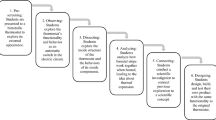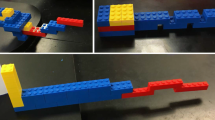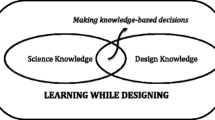Abstract
Given that many models of design-based learning in science education are grounded in forward engineering, in which students are challenged to use the engineering design process to achieve unknown solutions to engineering problems, this study aims to examine the potential of using reverse engineering, as an alternative approach to design-based learning, to facilitate students’ understanding of scientific concepts. Two classes of ninth-grade students, one with 21 students and the other with 24 students, participated in this study by engaging in reverse engineering activities where they dissected and investigated how a bimetal thermostat functions. The primary instrument is a conceptual test, comprising 12 multiple-choice questions about thermal expansion, which was completed by the students before and after the reverse engineering activities. A paired-samples t-test was used to analyse the data. Discourse analysis of students’ verbal interactions within small groups was also used to illustrate their learning process. The results indicate that both classes exhibited significant improvements in their understanding of thermal expansion, to a large or medium extent. Thus, it is recommended that reverse engineering can be used as a pedagogical approach to facilitating students’ learning of scientific concepts.



Similar content being viewed by others
References
Apedoe, X. S., Reynolds, B., Ellefson, M. R., & Schunn, C. D. (2008). Bringing engineering design into high school science classrooms: The heating/cooling unit. Journal of Science Education and Technology, 17(5), 454–465. https://doi.org/10.1007/s10956-008-9114-6
Arik, M., & Topcu, M. S. (2020). Implementation of engineering design process in the K-12 science classrooms: Trends and issues. Research in Science Education. https://doi.org/10.1007/s11165-019-09912-x
Bureau of Academic Affairs and Educational Standards. (2017). Indicators and core learning content in science according to the basic education core curriculum B.E. 2551 (revised version B.E. 2560). Bangkok: Press of the Agricultural Co-operative Federation of Thailand
Chusinkunawut, K., Henderson, C., Nugultham, K., Wannagatesiri, T., & Fakcharoenphol, W. (2020). Design-based science with communication scaffolding results in productive conversations and improved learning for secondary students. Research in Science Education. https://doi.org/10.1007/s11165-020-09926-w
Cotabish, A., Dailey, D., Robinson, A., & Hughes, G. (2013). The effects of a STEM intervention on elementary students’ science knowledge and skills. School Science and Mathematics, 113(5), 215–226. https://doi.org/10.1111/ssm.12023
Creswell, J. W., & Plano Clark, V. L. (2011). Designing and conducting mixed methods research (2nd ed.). SAGE Publications
Creswell, J. W., & Plano Clark, V. L. (2018). Designing and conducting mixed methods research (3rd ed.). SAGE Publications
Crismond, D. (2001). Learning and using science ideas when doing investigate-and-redesign tasks: A study of naïve, novice, and expert designers doing constrained and scaffolded design work. Journal of Research in Science Teaching, 38(7), 791–820. https://doi.org/10.1002/tea.1032
Dankenbring, C., & Capobianco, B. M. (2016). Examining elementary school students’ mental models of Sun-Earth relationships as a result of engaging in engineering design. International Journal of Science and Mathematics Education, 14(5), 825–845. https://doi.org/10.1007/s10763-015-9626-5
Faikhamta, C., & Ladachart, L. (2016). Science education in Thailand: Moving through crisis to opportunity. In M, Chiu (Ed.), Science education research and practice in Asia (pp. 197–214). Springer: Singapore. https://doi.org/10.1007/978-981-10-0847-4_11
Fortus, D., Dershimer, R. C., Krajcik, J., Marx, R. W., & Mamlok-Naaman, R. (2004). Design-based science and student learning. Journal of Research in Science Teaching, 41(10), 1018–1110. https://doi.org/10.1002/tea.20040
Institute for the Promotion of Teaching Science and Technology. (2015). Basic knowledge about STEM education. Retrieved April 4, 2021, from http://www.stemedthailand.org/wp-content/uploads/2015/03/newIntro-to-STEM.pdf
Kelly, T. R., & Knowles, J. G. (2016). A conceptual framework of integrated STEM education. International Journal of STEM Education, 3(11). https://doi.org/10.1186/s40594-016-0046-z
Kolodner, J. L., Camp, P. J., Crismond, C. D., Fasse, B., Gray, J., Holbrook, J., Puntambekar, S., & Ryan, M. (2003). Problem-based learning meets case-based reasoning in the middle-school science classroom: Putting learning by designTM into practice. The Journal of the Learning Sciences, 12(4), 495–547. https://doi.org/10.1207/S15327809JLS1204_2
Lamancusa, J., Torres, M., Kumar, V., & Jorgensen, J. (1996). Learning engineering by product dissection. The 1996 ASEE Annual Conference Proceedings. Retrieved April 3, 2021, from https://peer.asee.org/learning-engineering-by-product-dissection.pdf
Lehtela, P. L. (2001). Role-playing, conceptual change, and the learning process: A case study of 7th grade pupils. In H. Behrendt, H. Dahncke, R. Duit, W. Graber, M. Komorek, A. Kross, & P. Reiska (Eds.). Research in science education - Past, present, and future. Dordrecht: Springer. https://doi.org/10.1007/0-306-47639-8_28
Lewis, T. (2006). Design and inquiry: Bases for an accommodation between science and technology education in the curriculum? Journal of Research in Science Teaching, 43(3), 255–281. https://doi.org/10.1002/tea.20111
Falloon, G., Hatzigianni, M., Bower, M., Forbes, A., & Stevenson, M. (2020). Understanding K-12 STEM education: A framework for develo** STEM literacy. Journal of Science Education and Technology, 29(3), 369–385. https://doi.org/10.1007/s10956-020-09823-x
Mehalik, M. M., Doppelt, Y., & Schuun, C. D. (2008). Middle-school science through design-based learning versus scripted inquiry: Better overall science concept learning and equity gap reduction. Journal of Engineering Education, 97(1), 71–85. https://doi.org/10.1002/j.2168-9830.2008.tb00955.x
McGowan, V. C., Ventura, M., & Bell, P. (2017). Reverse engineering: How students’ everyday experiences can support science learning through engineering design. Science and Children, 54(8), 68–72
Morgan, G. A., Leech, N. L., Gloeckner, G. W., & Barrett, K. C. (2013). IBM SPSS for introductory statistics: Use and interpretation. Routledge
Otto, K. N., & Wood, K. L. (1998). Product evolution: A reverse engineering and redesign methodology. Research in Engineering Design, 10(4), 226–243. https://doi.org/10.1007/s001639870003
Pleasants, J., & Olson, J. K. (2019). What is engineering? Elaborating the nature of engineering for K-12 education. Science Education, 103(1), 145–166. https://doi.org/10.1002/sce.21483
Promboon, S., Finley, F. N., & Kaweekijmanee, K. (2018). The evolution and current status of STEM education in Thailand: Policy directions and recommendations. In G. W. Fry (Ed.), Education in Thailand: An old elephant in search of a new mahout (pp. 423–459). Springer. https://doi.org/10.1007/978-981-10-7857-6_17
Redish, E. F., Scherr, R. E., & Tuminaro, J. (2006). Reverse-engineering the solution of a “simple” physics problem: Why learning physics is harder than it looks. The Physics Teacher, 44(5), 293–300. https://doi.org/10.1119/1.2195401
Rouse, A. G., & Rouse, R. (2019). Third graders’ use of writing to facilitate learning of engineering concepts. Journal of Research in Science Teaching, 56(10), 1406–1430. https://doi.org/10.1002/tea.21581
Schauble, L. (1990). Belief revision in children: The role of prior knowledge and strategies for generating evidence. Journal of Experimental Child Psychology, 49(1), 31–57. https://doi.org/10.1016/0022-0965(90)90048-d
Schauble, L., Klopfer, L. E., & Raghavan, K. (1991). Students’ transition from an engineering model to a science model of experimentation. Journal of Research in Science Teaching, 28(9), 859–882. https://doi.org/10.1002/tea.3660280910
Schnittka, C., & Bell, R. (2011). Engineering design and conceptual change in science: Addressing thermal energy and heat transfer in eighth grade. International Journal of Science Education, 13(1), 1861–1887. https://doi.org/10.1080/09500693.2010.529177
Sheppard, S. D. (1992). Mechanical dissection: An experience in how things work. Proceedings of the Engineering Education: Curriculum Innovation and Integration. Retrieved April 3, 2021, from http://www-cdr.stanford.edu/images/Dissection/dissphil.pdf
Subramaniam, K. (1999). Practical physics: Students design appliances containing bimetallic strips. The Science Teacher, 66(4), 37–39
The Design-Based Research Collective. (2003). Design-based research: An emerging paradigm for educational inquiry. Educational Researcher, 32(1), 5–8. https://doi.org/10.3102/0013189X032001005
Verdugo, J. J., Solaz-Portoles, J. J., & Sanjose, V. (2016). Pre-service primary school teachers’ science content knowledge: An instrument for its assessment. International Journal of Innovation in Science and Mathematics Education, 24(2), 37–51
Vidak, A., Odzak, S., & Mesic, V. (2019). Teaching about thermal expansion: Investigating the effectiveness of a cognitive bridging approach. Research in Science and Technological Education, 37(3), 324–345. https://doi.org/10.1080/02635143.2018.1551200
Waring, H. Z. (2018). Discourse analysis: The questions discourse analysts ask and how they answer them. Routledge
Wendell, K. B., & Rogers, C. (2013). Engineering design-based science, science content performance, and science attitudes in elementary school. Journal of Engineering Education, 102(4), 513–540. https://doi.org/10.1002/jee.20026
Wieselmann, J. R., Dare, E. A., Ring-Whalen, E. A., & Roehrig, G. H. (2020). I just do what the boys tell me: Exploring small group student interactions in an integrated STEM unit. Journal of Research in Science Teaching, 57(1), 112–144. https://doi.org/10.1002/tea.21587
Wieselmann, J. R., Keratithamkul, K., Dare, E. A., Ring-Whalen, E. A., & Roehrig, G. H. (2021). Discourse analysis in integrated STEM activities: Methods for examining power and positioning in small group interactions. Research in Science Education, 51(1), 113–133. https://doi.org/10.1007/s11165-020-09950-w
Wood, K. L., Jensen, D., Bezdek, J., & Otto, K. N. (2001). Reverse engineering and redesign: Courses to incrementally and systematically teach design. Journal of Engineering Education, 90(3), 363–374. https://doi.org/10.1002/j.2168-9830.2001.tb00615.x
Yeo, S., & Zadnik, M. (2001). Introductory thermal concept evaluation: Assessing students’ understanding. The Physics Teacher, 39(8), 496–504. https://doi.org/10.1119/1.1424603
Younis, M. B., & Tutunji, T. (2012). Reverse engineering course at Philadelphia University. European Journal of Engineering Education, 37(1), 83–95. https://doi.org/10.1080/03043797.2012.658508
Yu, C. H. (2021). Threats to validity of research design. Retrieved April 4, 2021, from http://www.creative-wisdom.com/teaching/WBI/threat.shtml
Zhong, B., Kang, S., & Zhan, Z. (2020). Investigating the effect of reverse engineering pedagogy in K-12 robotics education. Computer Applications in Engineering Education. https://doi.org/10.1002/cae.22363.
Funding
This study was financially supported by Thailand Science Research and Innovation (previously known as the Thailand Research Fund) under the code RSA6180010.
Author information
Authors and Affiliations
Corresponding author
Ethics declarations
Ethics Approval
All procedures performed in this study involving human participants were in accordance with the ethical principles approved by the University of Phayao’s Human Ethics Committee under the number 2/048/62.
Informed Consent
Informed consent was obtained from all individuals participants included in the study.
Conflict of Interest
The authors declare no competing interests.
Additional information
Publisher's Note
Springer Nature remains neutral with regard to jurisdictional claims in published maps and institutional affiliations.
Rights and permissions
About this article
Cite this article
Ladachart, L., Cholsin, J., Kwanpet, S. et al. Using Reverse Engineering to Enhance Ninth-Grade Students’ Understanding of Thermal Expansion. J Sci Educ Technol 31, 177–190 (2022). https://doi.org/10.1007/s10956-021-09940-1
Accepted:
Published:
Issue Date:
DOI: https://doi.org/10.1007/s10956-021-09940-1




